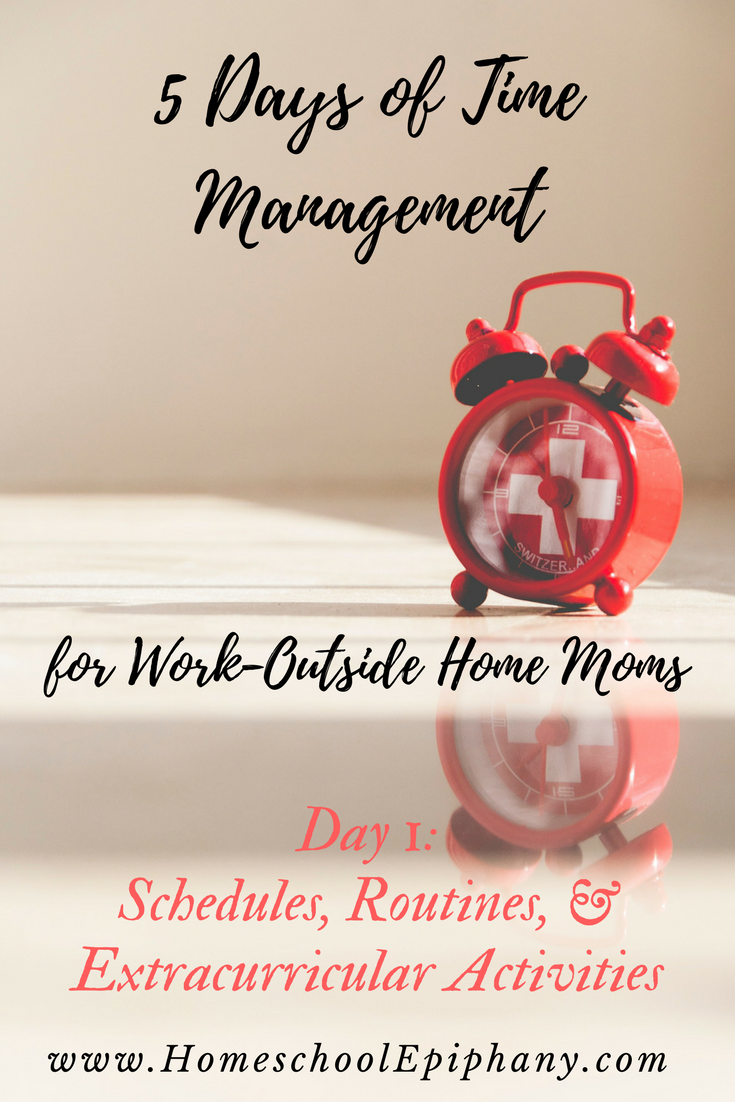This post contains affiliate links. You can read my Disclosure Page.

As working moms that homeschool and when creating schedules, routines, and planning for extracurricular activities, you will need to keep in mind that learning doesn’t occur from Monday to Friday. It can happen on any day. You can even create an academic schedule that involves teaching on the weekends. Homeschooling is a lifestyle, and when you chose this lifestyle, your schedule will be entirely unique. Keep that in mind as we discuss these topics.
SCHEDULES
Schedules are the processes or the lists of activities that provide a time frame to get them accomplished. When it comes to schedules, I hear many opinions concerning homeschooling. They can be either, rigid, laid back, or flexible. I lean toward the flexible because that one gives me the grace “to accept the things I cannot change,” and “the courage to change the things I can”.
Of course, you will create a homeschooling schedule around your work schedule. If you work dayshift, most likely you will be schooling your children in the evening or early night. If you work evening shift, most likely you will be teaching your children in the morning, and if you work night shift, you will be schooling either as soon as you come home from work in the morning, or in the afternoon after you have slept, depending which works best for your physical rest.
Tips for setting up a schedule:
- Be realistic, don’t schedule more than what can actually be done.
- Write down your schedule for each day including your time at work.
- Write down your children’s schedule including the time that you are away working.
- Highlight the hours you are at home with your children. You will be using some of those to school them.
- Utilize a planner. It is quite difficult to keep everything in your head (more about this on Day 5).
- Begin with the monthly calendar in your planner. Write down days that you will be off from work, events, music lessons, co-ops, field trips, dates with hubby, pay day, bills due, etc.
- On the weekly pages, write down the week’s goals and must do’s. Write yours and your children’s as well. Use blocks of time if possible.
- For each day, set time blocks for your children’s normal routines (breakfast, chores, etc), independent work, and teaching time.
Setting up a Homeschooling Schedule:
If you are a beginner homeschooler, nothing beats the efficiency of a boxed curriculum. Lesson plans are already built in for all subjects and you just have to follow it. The important thing to do, is to go over all the lessons for each subject. Determine which subjects and lessons you can introduce at the beginning of the week, and then have your children work on assignments independently throughout the week.
Some subjects that can be work on independently:
- Geography
- Copywork/Writing/Handwriting
- Memorization
- Keyboarding
- Logic (if using workbooks like Kumon)
- Reading/Literature
Some subjects that you will need to teach one on one:
- Math
- Phonics
- Science
- History
- Latin/Foreign Languages
Even for the ones that require you to teach, if it only needs a lesson per week, you can do that, on one day, and they can work independently on assignments for the rest of the week. Just make sure that whoever is taking care of your children while you are away at work, knows of these assignments and makes sure that the children work on them. Keep in mind as well, that not all subjects need to be taught everyday. For example, history and science can be taught once a week.
Question: How many hours a day will you need to dedicate for one-one/group learning?
Answer: I say 2-3 hours. It depends on the age of your children and the subjects. I recommend doing experiments/projects on your off day, or at least work a little bit at a time if you plan for it on the days you work.
ROUTINES
Routines are those activities that you consistently do and may include schedules. Routines are broken down according to time of day. It includes the chores, homeschooling time, afternoon activities, and bedtime ‘routines’. Children thrive with routines. Their brains record the series of steps required for an activity. They get used to the routine. Break their routine and you may experience behavioral issues, this occurs often in younger children.
When you work on creating a routine, you do yourself a favor by minimizing the stress of everything that revolves about getting to work on time. You know when to have your meals packed to go, and when bills need to be taken care of. More on bills and “other home stuff” on day 2 of this series “Balancing the ‘Other Home Stuff'”. You will also prevent getting off schedule, which causes a derail from your original plan.
Routines also help children establish discipline in their lives. They know what is expected of them, and what they expect of you at certain times.
EXTRACURRICULAR ACTIVITIES
You will have to be careful on this one. You can’t play the comparison game with other fellow homeschooling moms. I’m going to deliver it to you clearly: You won’t be able to do that many. In fact, you may not even have the time to do most of them. Field trips? Most of them fall on Fridays, then on Wednesdays, and sometimes on the other days. Unless you have one of those days off from work, or request time-off from work to attend, you work in the evening/night, or have a relative/friend to take your children, it won’t be able to happen. So my advice is to chose wisely.
“Do as I say, and not as I do”
Last year I did better as far as extracurricular activities goes. This year not too much. The reason is because I thought I had it under control and could tackle a bit more. I ended up putting too much on my plate, and it all resulted in a big soup of overwhelm and stress. Learned my lesson. Next academic year I won’t accept too many responsibilities like coordinating multiple academic events for the homeschool association. There lies the importance of learning to say “no”.
When you are considering to add one more responsibility to your life, you will have to really sit down and evaluate which other one you can give up, because you won’t be able to accomplish it all and well. It is better to have a few responsibilities, but being able to perform well on them is far better and productive than taking on too much and performing in all at a mediocre level.
You will need to really prioritize the skills you want your children to learn (e.g. music, sports) and determine what really will be worth your time invested. For example, last year my son was in karate, and I had him and his older sister in music lessons as well. It was hectic! I barely had time to get anything done academically, so my husband and I decided to just keep them both in music (he’s learning to play guitar and my daughter piano). It worked out better for us, and their lessons are on a day that I’m consistently off from work.
Consider the following when trying to decide on participating on a field trip:
- Will it enhance matters being currently learned?
- Will it be worth the time taken away from your determined schedule (e.g. will it set your homeschooling schedule off)?
- Will it disturb your academic plan or will it cause a project delay?
I hope this gave you an idea of how to plan your schedule, routines, and extracurricular activities. For a full month on successful schedules of working moms visit:
“We can do all things through Christ, who strengthens us” (Phil. 4:13), but we can’t do them all at once.
Also in this series:
Introduction: 5 Days of Time Management for Work-Outside Home Moms
Day 1: Schedules, Routines, & Extracurricular Activities
Day 2: Balancing the “Other Home Stuff”
Day 4: Managing Personal Downtime
This series is part of a collection of themed series of 5 Day Hopscotch by iHN.








Leave a Reply